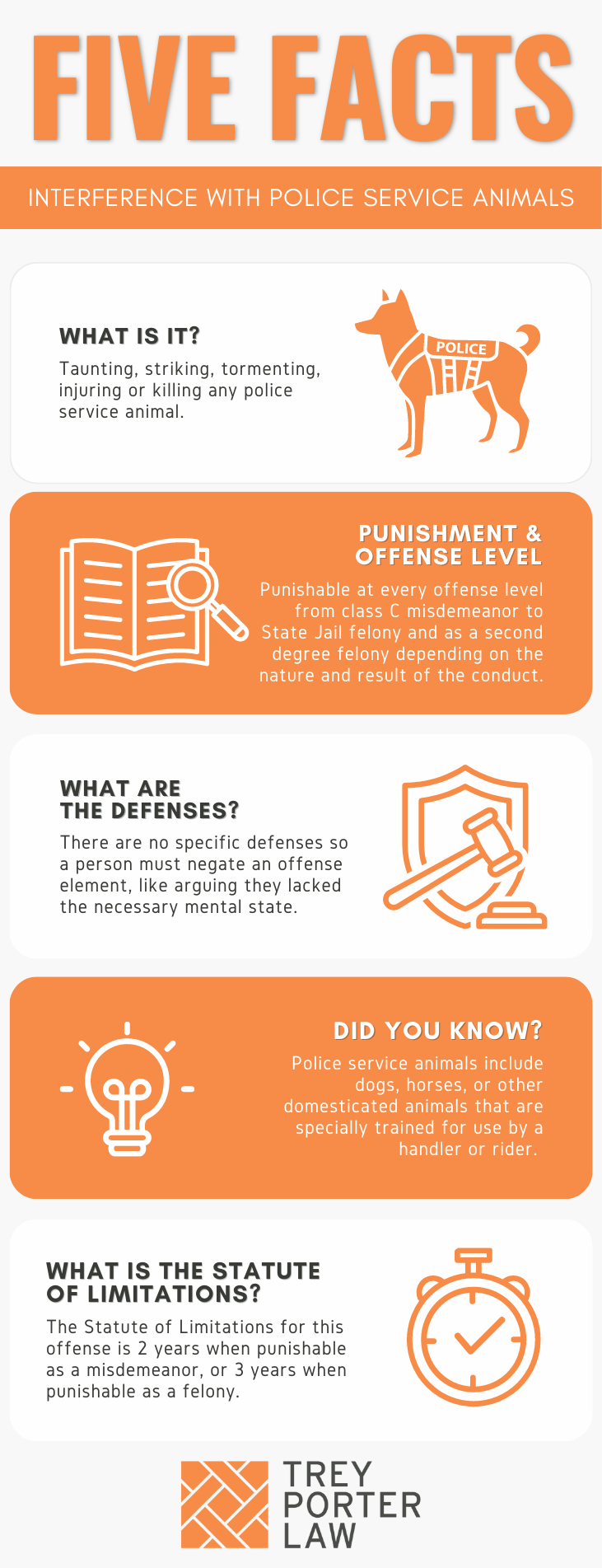WHAT IS INTERFERENCE WITH POLICE SERVICE ANIMALS IN TEXAS?
The Texas law against interference with police service animals prohibits recklessly engaging in any conduct that could injure or kill a police service animal, or taunting, hitting, releasing, and feeding the animal without permission.

WHAT IS THE INTERFERENCE WITH POLICE SERVICE ANIMALS LAW IN TEXAS?
Tex. Penal Code § 38.151. INTERFERENCE WITH POLICE SERVICE ANIMALS.
(b) A person commits an offense if the person recklessly:
(1) taunts, torments, or strikes a police service animal;
(2) throws an object or substance at a police service animal;
(3) interferes with or obstructs a police service animal or interferes with or obstructs the handler or rider of a police service animal in a manner that:
(A) inhibits or restricts the handler’s or rider’s control of the animal; or
(B) deprives the handler or rider of control of the animal;
(4) releases a police service animal from its area of control;
(5) enters the area of control of a police service animal without the effective consent of the handler or rider, including placing food or any other object or substance into that area;
(6) injures or kills a police service animal; or
(7) engages in conduct likely to injure or kill a police service animal, including administering or setting a poison, trap, or any other object or substance.
(c) An offense under this section is:
(1) a Class C misdemeanor if the person commits an offense under Subsection (b)(1);
(2) a Class B misdemeanor if the person commits an offense under Subsection (b)(2);
(3) a Class A misdemeanor if the person commits an offense under Subsection (b)(3), (4), or (5);
(4) except as provided by Subdivision (5), a state jail felony if the person commits an offense under Subsection (b)(6) or (7) by injuring a police service animal or by engaging in conduct likely to injure the animal; or
(5) a felony of the second degree if the person commits an offense under Subsection (b)(6) or (7) by:
(A) killing a police service animal or engaging in conduct likely to kill the animal;
(B) injuring a police service animal in a manner that materially and permanently affects the ability of the animal to perform as a police service animal; or
(C) engaging in conduct likely to injure a police service animal in a manner that would materially and permanently affect the ability of the animal to perform as a police service animal.
WHAT IS THE PENALTY CLASS FOR INTERFERENCE WITH POLICE SERVICE ANIMALS IN TEXAS?
The penalty classification for interference with a police service animal ranges from a Class C misdemeanor to a second degree felony, depending on the severity of the conduct.
- Class C misdemeanor, punishable by a maximum fine of $500, if the person:
- taunted, tormented, or struck a police service animal
- Class B misdemeanor, punishable by up to 180 days in jail, if the person:
- threw an object or substance at a police service animal
- Class A misdemeanor, punishable by up to one year in jail, if the person:
- interfered with or obstructed the police service animal;
- interfered with or obstructed the handler or rider in a manner that inhibited, restricted, or deprived the handler’s or rider’s control of the police service animal;
- released a police service animal from its area of control;
- entered the area of control without permission, or put food or any other substance or object into the animal’s area.
- State jail felony, punishable by 180 days to two years in a state jail facility, if the person:
- injured or engaged in conduct likely to injury a police service animal
- Second degree felony, punishable by two to 20 years in prison, if the person:
- killed a police service animal;
- injured or engaged in conduct likely to injure a police service animal such that its ability to perform as a police service animal is permanently affected.
WHAT IS THE PUNISHMENT RANGE FOR INTERFERENCE WITH POLICE SERVICE ANIMALS IN TEXAS?
The punishment ranges for interference with a police service animal depend on the severity of the charge:
- Class C misdemeanor: maximum fine of $500;
- Class B misdemeanor: up to 180 days in jail, and a maximum fine of $2,000;
- Class A misdemeanor: up to one year in jail, and a maximum fine of $4,000;
- State jail felony: 180 days to two years in a state jail facility, and a maximum $10,000 fine;
- Second degree felony: two to 20 years in prison, and a maximum $10,000 fine.
WHAT ARE THE PENALTIES FOR INTERFERENCE WITH POLICE SERVICE ANIMALS IN TEXAS?
A person charged with interference with a police service animal may be eligible for probation after a conviction, or deferred adjudication without a conviction. The maximum periods of community supervision depend on the severity of the charge:
- Class C misdemeanor: up to 180 days;
- Class A or B misdemeanor: up to two years;
- State jail felony: between two and five years, with the possibility of extending supervision for up to ten years;
- Second degree felony: between two and ten years;
WHAT ARE THE DEFENSES TO INTERFERENCE WITH POLICE SERVICE ANIMALS IN TEXAS?
The statute does not authorize specific defenses to interference with police service animals. A person accused thereof may attempt to negate at least one of the elements the State must prove at trial.
WHAT IS THE STATUTE OF LIMITATIONS FOR INTERFERENCE WITH POLICE SERVICE ANIMALS IN TEXAS?
The limitation period for interference with a police service animal categorized as a misdemeanor is two years. If charged as a state jail or second degree felony, the limitation period is three years.
INTERFERENCE WITH POLICE SERVICE ANIMALS IN TEXAS
Interfering with police service animals includes taunting or hitting police dogs and horses, which is only punishable by a fine. More severe conduct, such as killing or permanently disabling a police service animal, a second degree felony.
















